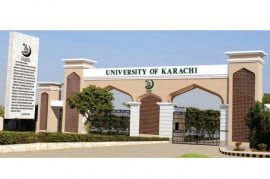
The government is waking up to the need for permanent solutions to tackle malaria, dengue and flooding given that the country "may have to learn to live with heavy rains and floods due to global climate change".
According to President Asif Ali Zardari's spokesperson Farhatullah Babar, this was the outcome after a slew of meetings and even more briefings on Wednesday at Bilawal House. Sindh Chief Minister Qaim Ali Shah, the president's sister MNA Faryal Talpur, doctors and dengue experts from Pakistan and Sri Lanka were at the briefing.
The president said he wanted the provincial malaria control programme to be restructured for starters and more work done to monitor dengue in the province. For its part, the Sindh government has already nominated provincial and district focal persons to keep an eye on the mosquito-borne disease and set up a manned surveillance centre in every district. Big private hospitals have also been integrated with the provincial dengue cell so that new cases are reported regularly.
The city district government of Karachi (CDGK) has started fumigating neighbourhoods and houses to kill the vectors of the disease and DCOs have been told to fumigate their districts as well.
As far as precautions go, the president wants 'hotspots’ to be marked out with the help of historical data of outbreaks. He wants a media campaign so that the public knows how to react and protect itself.
When told that Karachi had 32 fumigation machines but only 21 vehicles to carry them around, he ordered that more should be bought. The Sir Lankan High Commissioner, who attended the meeting, was thanked for bringing his medical team to help.
The president even suggested that Neem trees be planted by the provincial government as this species releases chemicals that act as mosquito repellents. As long as we take all precautionary measures, there was no need to panic, was his optimistic conclusion.
Stagnant rainwater
The president was also briefed on what was being done to drain stagnant rainwater that has collected in parts of Sindh.
Zardari called for public-private partnership to put together a plan to drain the water and suggested using a gravity system or pump to connect outlets to the existing drainage system.
Meanwhile, the discharge capacity of drains could be improved by using heavy machinery to remove obstructions. The president asked that this process be monitored daily using satellite imaging and that these images be sent to the president's secretariat via e-mail.
Earlier, the president spent some time at the flood control room at Bilawal House and took a look at relief work in the Khairpur and Benazirabad districts. He reviewed how much progress had been made on medicines, tents, mosquito repellents and other relief measures.
The National Database and Registration Authority chairman was told to issue 'Pakistan Cards' to flood victims within a week and to keep an eye on the distribution of relief goods to prevent misuse and pilferage.
The chief minister's daughter MNA Nafisa Shah of Khairpur, the president's other sister MNA Azra Fazal Pechuho of Benazirabad and MPAs and district officials also briefed the president.
Published in The Express Tribune, September 22nd, 2011.
COMMENTS (2)
Comments are moderated and generally will be posted if they are on-topic and not abusive.
For more information, please see our Comments FAQ





1732783305-0/Untitled-design-(6)1732783305-0-270x192.webp)











Maybe this is the first positive step our presidents has taken since he came to power!!
"Dair ayay durust ayay " (better late than never)
Excellent job Mr. President! That was the demand of the hour. Your personal interest is sure going to change things on the ground.